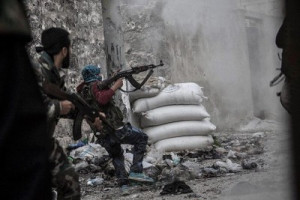
External factors still play a major role in fueling the civil war in Syria. And if the primary source of aid and support to the official government is provided by Iran and the Lebanese group Hezbolla, then pitted against the regime of Bashar al-Assad stand the USA, NATO and EU countries, Saudi Arabia, Qatar, Turkey, and the involved territory of Jordan. From the point of view of military, financial and economic potential, the advantage does not lie with supporters of Bashar al-Assad.
The temporary lull on Syrian battlegrounds can only be explained as waiting for Washington to complete the process of disposing of Syrian chemical weapons (supposedly approximately 20% of the original amount are left). At the same time, the armed opposition forces are regrouping, and recruiting and training fighters for the so-called “Free Syrian Army” (FSA). In addition to supplying them with new shipments of small arms and ammunition, the CIA is establishing channels to ship orders of anti-tank and anti-aircraft guided missiles (ATGMs and MANPADS, respectively) to the FSA. Ostensibly, the Syrian opposition has already been supplied with the first shipment of American BGM-71 Tow ATGMs and a small number of MANPADS through Jordan and Turkey. Thus, Washington anticipates that the ability of government forces to use tanks and aircraft will be substantially reduced, and a significant change in the course of hostilities will be effected. It is expected that the opposition may use these weapons in battles near Aleppo.
Previously, Barrack Obama officially opposed the sales of MANPADS to Syrian insurgents, and American military aid to FSA forces was limited to the supply of small arms, ammunitions, military equipment and humanitarian aid. The White House stated in February 2014 that if MANPADS fell “into the wrong hands”, then the weapon could be used for terrorist purposes, including against civilian aircraft. Saudi Arabia and Qatar are actively lobbying for the delivery of ATGMs and MANPADS to Syria. One of the arguments made by Riyadh in favor of accelerated deliveries of portable missile systems to FSA forces is the fact that they are available to the so-called “third force” in the Syrian crisis – radical Islamist groups with ties to Al-Qaeda. The Pentagon (DIA) confirms that after the fall of Muammar Qaddafi’s regime in Libya, more than 20 thousand Igla-1 and Strela-2 MANPADS that had been purchased form the USSR my have fallen into the hands of militant Islamists. It is assumed that Al-Qaeda alone managed to obtain between 7 and 12 thousand MANPADS in Libya, and that some of these are already being used by fighters in Syria. Specialists have not ruled out that radical militants may also obtain Stinger MANPADS previously delivered in Afghanistan by the CIA. In general, the international community cannot at this time effectively monitor illegal arms dealers, for whom “business with blood” is the main source of profit.
Russia has expressed its anxiety over Saudi Arabia and Qatar’s intentions to purchase MANPADS and anti-tank systems from the USA or on the black market for the Syrian opposition. Russia’s Ministry of Foreign Affairs emphasizes that if such weaponry falls into the hands of terrorists, who currently abound in Syria, there is a chance that it will be used outside of the Middle East, that is, they may spread around the globe. The calculations by Washington and Riyadh that the targeted supply of missile systems to FSA forces will increase their military effectiveness against government forces and bring about the overthrow of Bashar al-Assad’s regime are unjustified and fraught with dangerous side effects for regional and international security. The armed clashes that took place in 2013-14 between FSA forces and the Islamist fighters of Jabhat al-Nusra, the Islamic State of Iraq and the Levant, and other radical groups clearly demonstrate the potential for these missile systems to be seized by international terrorists.
Thus, the temporary lull in hostilities in Syria is being used by Washington and its allies to strengthen the armed opposition. The USA and its regional satellites refuse to abandon their goal of overthrowing Bashar al-Assad’s regime at any cost. The Geneva negotiations can only be interpreted as a screen for new aggressive actions by the USA and its partners in Syria. The delivery of ATGMs and MANPADS to opposition fighters is proof of this. In this situation, the simultaneous growth in the military potential of radical Islamist groups and the forces of international terrorism does not deter western “fighters for democracy”.
In Syria, as well as in Libya, Egypt, and Ukraine, the policy of double standards is clearly demonstrated, when western “doves” attempt to use terrorists and extremists to further their own interests, to divide them into “ours” and “theirs”, “useful” and “useless”. Through radical groups, all the way up to Al-Qaeda, the West attempts to overthrow regimes that are unpalatable to it, closing its eyes to their criminal nature, the risk to the global community, and the fact that they are listed as terrorist organizations by the USA, EU, and UN.
Stanislav Ivanov, PhD in Historical Science, Senior Researcher at the Institute of Oriental Studies, exclusively for the online magazine New Eastern Outlook.
